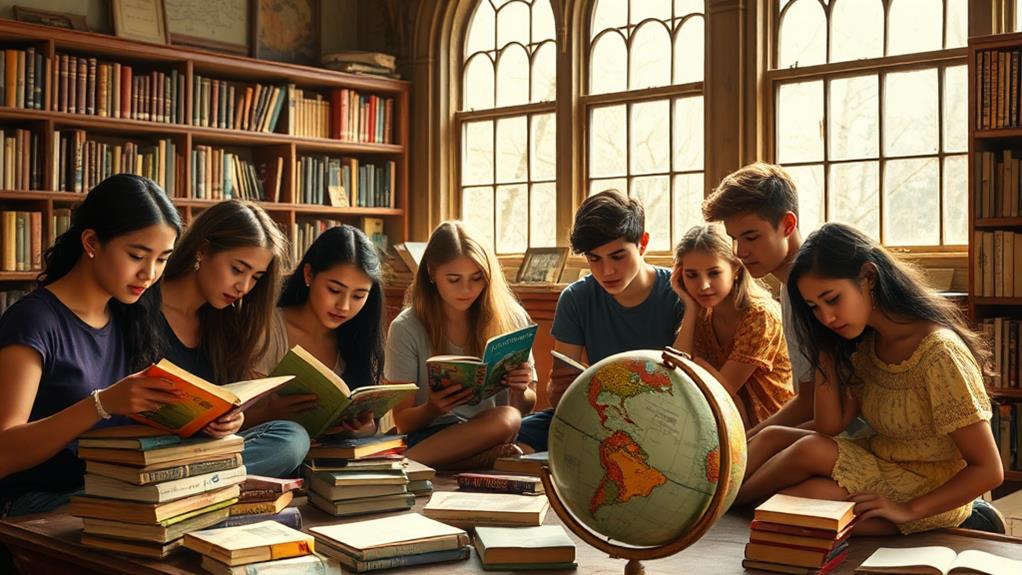BBC's Big Read highlights the novels that have captivated the UK, showcasing the stories that resonate with many. Launched in 2003, this initiative invited public nominations and votes, ultimately narrowing down to the most beloved titles. You'll find classics like "Pride and Prejudice," "To Kill a Mockingbird," and fantasy greats like "The Lord of the Rings." Each book tackles essential themes like love, justice, and identity, engaging readers through emotional journeys. This celebration of literature not only promotes reading but also fosters a unique connection within communities. Stick around, and you might uncover more insights about these timeless tales.
Overview of The Big Read
The Big Read sparked a national conversation about literature, inviting readers from all walks of life to share their favorite novels. Launched by the BBC in April 2003, this initiative aimed to identify the UK's best-loved book through public nominations and voting. You were encouraged to nominate your cherished reads, which culminated in a televised countdown of the top 100 novels on BBC2.
This initiative highlighted the importance of reading in enhancing mood and cognitive function, making it a valuable activity for all. The Big Read's efforts aligned with encouraging a reading habit that can enrich daily life and broaden perspectives.
This program didn't just stop at the top 100; it also offered a thorough online list that ranked books from 101 to 200, broadening the scope of engagement with literature. The scoring system played a vital role, combining the number of votes and their rankings to influence the final selection of top novels.
The Big Read's goal was to promote reading and foster community participation in literary discussions. You could see how it raised awareness of literature's cultural significance while also showcasing popular titles like "Harry Potter."
Impactful Novels on the List
When you explore the impactful novels on the list, you'll notice their significant cultural contributions and deep themes that resonate with the human experience.
Each story not only entertains but also shapes perspectives, influencing how you see the world around you. These books challenge you to reflect on societal issues and personal values, making their impact truly profound.
Cultural Significance in Literature
Books have a unique power to reflect and shape cultural values, making certain novels stand out for their profound impact on society.
Take "Pride and Prejudice," for instance; its exploration of social class and romantic relationships in 19th-century England highlights pressing cultural significance. You can see how these themes resonate with ongoing societal issues, as they encourage readers to examine class dynamics in their own lives.
Similarly, "To Kill a Mockingbird" confronts racial injustice and moral growth through a child's perspective, prompting vital conversations about equality and ethics.
George Orwell's "Nineteen Eighty-Four" critiques totalitarianism and surveillance, remaining relevant in today's discussions about privacy and freedom.
Then there's "Wuthering Heights," which, with its complex characters, investigates themes of love and revenge, solidifying its status as a classic of Gothic literature.
Meanwhile, "The Lord of the Rings" not only shaped the fantasy genre but also tackles timeless themes of good versus evil, friendship, and sacrifice.
Each of these impactful novels not only entertains but also challenges you to reflect on societal issues, making their cultural significance undeniable.
Themes of Human Experience
Literature often resonates deeply with the human experience, portraying themes that capture the complexities of life. Novels like "Things Fall Apart" by Chinua Achebe explore themes of identity and culture, illustrating how colonialism reshapes traditional societies and reflects broader societal changes.
You'll find that love stories, such as Jane Austen's "Pride and Prejudice," critique social behavior and romantic entanglements, revealing the intricacies of relationships in 19th-century England.
Adventure and conflict come alive in J.R.R. Tolkien's "The Fellowship of the Ring," where a quest symbolizes the timeless struggle between good and evil. This narrative not only entertains but also invites you to reflect on bravery and camaraderie.
Harper Lee's "To Kill a Mockingbird" powerfully tackles racial injustice, guiding you through moral growth amidst the racially charged American South, while George Orwell's "1984" explores life under totalitarian regimes, prompting you to question surveillance, freedom, and individuality.
These impactful novels engage you with profound themes, allowing you to see reflections of your own experiences and the broader human condition, reminding you of the shared struggles and triumphs that define us all.
Influence on Readers' Lives
As you explore the impactful novels on the BBC's Big Read list, you'll discover how these stories have shaped readers' perspectives and sparked meaningful conversations about critical social issues. Each novel carries its own influence, guiding you through themes that resonate deeply in today's society.
For instance, "To Kill a Mockingbird" opens your eyes to social justice and morality, with over 6 million ratings showcasing its lasting impact on understanding human rights.
Meanwhile, "Pride and Prejudice" invites you to reflect on love and social class, its average rating of 4.29 from 4.4 million readers underscoring its relevance in relationship discussions.
J.R.R. Tolkien's "The Lord of the Rings" inspires you through themes of friendship and bravery, evident in its impressive 4.53 rating.
George Orwell's "Nineteen Eighty-Four" serves as a stark reminder of totalitarianism and privacy concerns, impacting over 4.8 million readers with a rating of 4.19.
Finally, "Winnie the Pooh" evokes nostalgia, reinforcing themes of childhood innocence and friendship, as reflected in its 4.38 rating.
These novels don't just entertain; they transform your understanding of the world around you.
Celebrating Classic Literature

When you think about classic literature, you can't help but notice how it tackles timeless themes like love and morality. Works like "Pride and Prejudice" and "Wuthering Heights" showcase characters and relationships that still resonate today.
Similarly, Charles Dickens' "Great Expectations" explores themes of ambition and identity through the journey of its protagonist, Pip. These stories not only reflect societal issues, but they also invite you to connect with their enduring struggles and triumphs.
Timeless Themes Explored
Throughout the ages, classic literature has captivated readers by exploring timeless themes that resonate deeply with the human experience. These literary masterpieces tackle issues like social class, love, and moral growth, allowing you to connect with characters on a profoundly personal level.
Take "Pride and Prejudice," for example; Jane Austen intricately examines 19th-century marriage and societal expectations, revealing how social class influences relationships and personal choices.
In "To Kill a Mockingbird," Harper Lee presents a poignant narrative that highlights racial injustice through the innocent eyes of a young girl. This journey not only sheds light on moral growth but also encourages you to reflect on your own beliefs and values.
Similarly, "Jane Eyre" offers a strong female protagonist who embodies independence and resilience in a restrictive society, making it a significant piece of feminist literature.
Moreover, "Wuthering Heights" dives into the darker aspects of human emotion, showcasing the destructive power of love amid complex relationships.
Even dystopian works like "Nineteen Eighty-Four" remain relevant today, critiquing totalitarianism and the perils of surveillance. These timeless themes guarantee that classic literature continues to resonate with you and future generations.
Enduring Characters and Relationships
Enduring characters and their intricate relationships have always been at the heart of classic literature, drawing readers into their emotional journeys. These connections not only shape the narrative but also reflect deeper societal issues, making them timeless. Here are four iconic examples:
- Elizabeth Bennet and Mr. Darcy in "Pride and Prejudice" navigate class and societal expectations, showcasing how love can transcend social barriers.
- Jane Eyre portrays a strong-willed protagonist whose quest for independence reflects the struggles of women in a patriarchal society, emphasizing her determination and resilience.
- Heathcliff and Catherine Earnshaw in "Wuthering Heights" embody a tumultuous relationship fueled by passion and revenge, illustrating the destructive nature of love intertwined with social class.
- Scout Finch and Atticus in "To Kill a Mockingbird" highlight moral integrity and empathy in their fight against racial injustice, demonstrating the strength of familial bonds.
These enduring characters and their relationships resonate across generations, reminding us of the complexities of human emotion and connection.
Through their journeys, we explore themes of love, identity, and moral integrity that continue to captivate readers today.
Notable Fantasy Works
Fantasy literature has a unique power to transport readers to enchanting worlds filled with adventure and imagination. Among the most notable works, "The Lord of the Rings" by J.R.R. Tolkien stands out as a seminal piece that reshaped the genre. Published between 1954 and 1955, it introduces you to Middle-earth, a rich tapestry of characters and epic quests that has inspired countless adaptations, including a celebrated film trilogy.
This series exemplifies the thrilling adventures of young heroes commencing on epic quests and magical domains, enthralling the hearts of fantasy lovers everywhere.
Another enthralling series is J.K. Rowling's "Harry Potter," particularly "Harry Potter and the Goblet of Fire." Released in 2000, it presents the thrilling Triwizard Tournament and investigates themes of friendship and bravery, capturing the hearts of readers worldwide.
Philip Pullman's "His Dark Materials," starting with "Northern Lights" in 1995, blends fantasy with deep philosophical questions, challenging organized religion while taking you on a mesmerizing journey through parallel worlds.
Together, these works not only entertain but also offer profound insights, inviting you to explore themes of good versus evil, friendship, and the complexities of belief, making them essential reads in the fantasy genre.
Iconic Coming-of-Age Stories

Coming-of-age stories often resonate deeply with readers, capturing the universal journey of self-discovery and personal growth.
These narratives not only reflect the struggles of youth but also address broader societal issues, much like the themes of resilience and determination found in Louis Zamperini's survival story in *Unbroken*.
Here are four iconic coming-of-age novels that highlight this profound journey:
- The Outsiders by S.E. Hinton: Through Ponyboy Curtis, you witness the complexities of loyalty and identity amidst social class tensions.
- The Catcher in the Rye by J.D. Salinger: Holden Caulfield's alienation and loss critique societal norms, making you question your own adolescent challenges.
- To Kill a Mockingbird by Harper Lee: Scout Finch's perspective on racial injustice and moral growth in the Deep South offers a poignant look at empathy and understanding.
- A Tree Grows in Brooklyn by Betty Smith: Francie Nolan's struggles with poverty and aspirations paint a vivid picture of resilience and determination.
Each of these novels provides a unique lens on the coming-of-age experience, emphasizing self-discovery while tackling significant issues like racial injustice.
They remind you that growing up often involves traversing complex emotional landscapes.
Diverse Voices in Literature
Literature thrives on the richness of diverse voices, weaving together narratives that reflect the myriad experiences of humanity. When you explore the BBC's Big Read, you'll discover novels that investigate deep into themes of identity, showcasing how personal and cultural perspectives shape our lives.
For instance, Chimamanda Ngozi Adichie's "Half of a Yellow Sun" takes you through the Biafran War, illuminating its profound impact on identity and belonging. Similarly, Zadie Smith's "White Teeth" offers a compelling look at multiculturalism in modern Britain, capturing the complexities of immigrant experiences and how they forge new identities.
Ta-Nehisi Coates' "Between the World and Me" further contributes to this dialogue by exploring systemic racism and personal identity within the Black experience, urging readers to confront uncomfortable truths about race and privilege systemic racism and identity. Toni Morrison's "Beloved" emphasizes the importance of African American voices, addressing the legacy of slavery and its haunting trauma.
Chinua Achebe's "Things Fall Apart" further enriches this dialogue by examining colonialism's impact on traditional societies, reminding you of the need for diverse cultural perspectives in literature.
Themes of Friendship and Love

In literature, the bonds of friendship and love often serve as the heart of the story.
You'll see how romantic relationships are explored in works like "Pride and Prejudice," while childhood friendships shine in "Winnie the Pooh."
The complexities of desire and heartbreak, as seen in Tita's journey of love, further illustrate the depth of emotional connections.
These themes not only captivate readers but also resonate deeply, reminding us of the connections that shape our lives.
Bonds in Literature
Exploring the bonds of friendship and love in literature reveals how these themes shape characters and their journeys. These narratives reflect human nature and the profound connections we form with others. Through various stories, you can see how these relationships evolve and impact the characters' lives.
- "Pride and Prejudice": Austen illustrates the bond between Elizabeth Bennet and Mr. Darcy, showing how social class influences their friendship and love.
- "Winnie the Pooh": Milne highlights the loyalty and innocence found in the adventures of Pooh and his friends, emphasizing the lasting nature of childhood friendship.
- "The Lord of the Rings": Tolkien presents the Fellowship of the Ring, where Frodo and Sam's unwavering loyalty exemplifies the sacrifices made for friendship.
- "To Kill a Mockingbird": Harper Lee explores the complexities of friendship through Scout Finch and Boo Radley, revealing how empathy challenges societal prejudices.
These stories capture the essence of bonds in literature, demonstrating how friendship and love intertwine, reflecting both the beauty and struggles of human nature.
Romantic Relationships Explored
While love often takes center stage in romantic narratives, the underlying themes of friendship and personal growth shape these relationships profoundly. In *Pride and Prejudice*, you see Elizabeth Bennet and Mr. Darcy navigate misunderstandings, illustrating how friendship can blossom into romance only when both characters grow and evolve.
Similarly, *Wuthering Heights* presents Heathcliff and Catherine's passionate, yet destructive love, reminding you that sometimes, love can be a double-edged sword, emphasizing the significance of emotional maturity in relationships.
In *Bridget Jones's Diary*, you laugh along with Bridget as she juggles her romantic misadventures, showing you that friendship and self-improvement are essential in the quest for love in modern society.
Meanwhile, *The Forty Rules of Love* intertwines contemporary romance with Rumi's wisdom, revealing how friendships across cultures deepen our understanding of love.
Lastly, *The Color Purple* highlights the transformative power of love and sisterhood, showcasing resilience in the face of adversity.
These narratives remind you that friendships often serve as the backbone of romantic relationships, enriching your understanding of love and its complexities.
Childhood Friendships Celebrated
Childhood friendships often serve as the foundation for the love and loyalty we carry into adulthood.
These bonds shape our values and remind us of the joys of companionship. Several beloved books capture the essence of these friendships through enchanting adventures.
- "Winnie the Pooh" by A.A. Milne – Pooh and his friends navigate the Hundred Acre Wood, showcasing innocent loyalty and heartwarming adventures.
- "Harry Potter and the Goblet of Fire" by J.K. Rowling – Harry and his friends face the challenges of the Triwizard Tournament, demonstrating bravery and unwavering loyalty in the face of danger.
- "The Lion, the Witch and the Wardrobe" by C.S. Lewis – The Pevensie siblings band together in Narnia, revealing how their familial love and friendship are essential in overcoming evil.
- "Little Women" by Louisa May Alcott – The March sisters exemplify how love and friendship guide them through the trials of growing up and societal pressures.
These stories remind us that the adventures we share with friends, filled with loyalty and love, create lasting memories that shape who we become.
The Role of Adaptations
Adaptations play an essential role in bringing classic literature to life, engaging audiences and introducing timeless stories to new generations. You might've noticed how adaptations of beloved novels like "Pride and Prejudice," "The Lord of the Rings," and "Harry Potter" have transformed these works into cultural phenomena.
The "Harry Potter" film series, for instance, grossed over $7.7 billion worldwide, greatly boosting the books' popularity and reinforcing their status in modern literature. The themes of friendship, bravery, and self-discovery that resonate throughout the series, such as Harry's loyalty to his friends, are often highlighted in adaptations, making these narratives even more relatable to audiences themes of loyalty and bravery.
When successful adaptations hit the screen, they often attract new readers enthusiastic to explore the original novels. Films like "To Kill a Mockingbird" and "The Lion, the Witch and the Wardrobe" demonstrate how cinematic interpretations can receive both critical acclaim and box office success, further highlighting their cultural impact.
Additionally, adaptations can reignite interest in older works, as seen with "Wuthering Heights," which experienced a resurgence in readership following various film adaptations.
Ultimately, adaptations not only entertain but also spark meaningful discussions about the themes and messages embedded within the original stories, fostering a deeper appreciation for the literature that inspired them.
Reader Engagement and Voting

The BBC's Big Read initiative exemplifies how reader engagement can elevate a nation's literary landscape. By encouraging the public to nominate their favourite novels, the program fostered a sense of community and connection through literature.
The diverse collection of titles not only highlighted popular preferences but also sparked conversations around reading habits, much like how London's major bookstores promote literary discussions through events.
To facilitate this engagement, the BBC utilized various voting methods:
- Web Voting: Making it easy for many to participate online.
- SMS Voting: Allowing quick and accessible voting from mobile devices.
- Telephone Voting: Offering an option for those less tech-savvy.
- Social Media: Promoting discussions and sharing of favorites.
The initial phase led to a compilation of the top 200 novels, which was later narrowed down to 21 for final voting.
The scoring system combined total votes and average ratings from platforms like Goodreads, ensuring a fair representation of public sentiment.
The Big Read not only increased interest in literature but also set a precedent for community involvement in literary polls. It's a fantastic example of how reader engagement can truly shape a nation's literary identity.
The Lasting Legacy of Books
Books have a remarkable ability to shape our thoughts, beliefs, and cultures, leaving a legacy that transcends time. The BBC's Big Read initiative illustrates this power, engaging the public in a journey through literature that reflected the UK's reading preferences. With over 700,000 votes cast, the diverse list of novels revealed how deeply literature resonates with our collective identity.
J.R.R. Tolkien's "The Lord of the Rings" topped the charts, showcasing its significant cultural impact and the enduring charm of fantasy. Similarly, Agatha Christie's "Murder on the Orient Express" exemplifies the intricate relationship between storytelling and moral complexity, challenging readers to reflect on justice and retribution within a captivating plot themes of justice and morality.
The Big Read didn't just celebrate beloved novels; it ignited conversations around themes like identity, class, and societal issues. This dialogue cements literature's role in shaping cultural discourse, demonstrating that books are more than just stories—they're reflections of our society.
The initiative also set a precedent for future literary polls, encouraging community engagement and exploration of diverse narratives.
Conclusion
As you reflect on the titles that captivated a nation, you can't help but wonder—what makes a book truly unforgettable? Each story, whether a classic or a modern fantasy, weaves themes of love, friendship, and growth that resonate deeply. The adaptations breathe new life into beloved tales, igniting your imagination. But as you close the cover on your latest read, consider this: what impact will your favorite book leave behind, and which story will you pass on to others?



